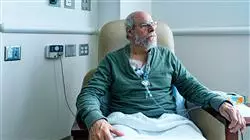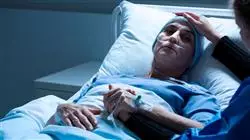University certificate
The world's largest faculty of psychology”
Why study at TECH?
Know and manage clinical assessments using appropriate instruments to design patient care planning”

When a person is diagnosed with cancer, they feel that their life is ending. In many cases, patients withdraw into themselves and avoid talking about their feelings. Therefore, to optimize the doctor-patient relationship, it is necessary for psychologists to carry out a series of interventions to improve communication with all parties. Therefore, a good psycho-oncologist is trained to read the verbal and non-verbal behavior of the patient, paying attention to all the reactions they manifest.
With this program, students will be trained in psychological practice, developing their empathy and compassion, which are essential elements to establish a healthy relationship between health personnel and patients. Likewise, the elements of therapeutic communication will be described in a theoretical and didactic way, as well as the attitudes and methods to make it effective.
On the other hand, the assessment of the cancer patient's needs is essential to provide a better treatment. In this sense, students will know and handle such assessment by means of the appropriate instruments, such as the SF-36 Health Questionnaire or the Emotional Distress Screening Questionnaire (DME).
Finally, they will have the opportunity to learn the necessary steps in psycho-oncological research; from the formulation of a question and literature review, to sample selection, data collection, or the identification of dependent, independent and extraneous variables, as well as the degree of reliability, validity and the most frequent mistakes made in psycho-oncological research.
Get involved in the development of different research projects to formulate new theories and techniques”
This Postgraduate diploma in Clinical Assessment in Psycho-Oncology contains the most complete and up-to-date educational program on the market Its most notable features are:
- Practical cases presented by experts in Psycho-Oncology
- The graphic, schematic, and practical contents with which they are created, provide scientific and practical information on the disciplines that are essential for professional practice
- Practical exercises where the self-assessment process can be carried out to improve learning
- Its special emphasis on innovative methodologies
- Theoretical lessons, questions to the expert, debate forums on controversial topics, and individual reflection assignments
- Content that is accessible from any fixed or portable device with an Internet connection
Develop a plan for systematic research into the relationships between behavior and cancer”
The program includes, in its teaching staff, professionals from the sector who bring to this program the experience of their work, in addition to recognized specialists from prestigious reference societies and universities.
Its multimedia content, developed with the latest educational technology, will allow professionals to learn in a contextual and situated learning environment, i.e., a simulated environment that will provide immersive education programmed to prepare in real situations.
The design of this program focuses on Problem-Based Learning, by means of which professionals must try to solve the different professional practice situations that are presented to them throughout the academic year. For this purpose, the student will be assisted by an innovative interactive video system created by renowned and experienced experts.
Assess family threats, needs and resources, applying the necessary family assessment tools"

Detects and solves problems in the patients' communication with their doctors thanks to this Postgraduate diploma"
Syllabus
The content of this syllabus is essential for the professional development of psychologists who wish to help oncology patients. This way, they will be able to develop their empathy and compassion to understand the patient's situation, while acquiring tools to guarantee their autonomy and individuality as patients. They will also learn the protocol of the most commonly used tests in the field to estimate the emotional health of patients.

It guarantees the patient's individuality so that they can make their own decisions taking into account their doctor's opinion”
Module 1. Communication with the Oncologic Patient
1.1. Illness, Communication and the Helping Relationship
1.1.1. Doctor-Patient Communication as a Possible Factor of Improvement and Iatrogenesis. Pain and Suffering Prevention
1.1.2. Communication Barriers
1.2. How to Give Bad News About Cancer
1.2.1. Answers to Difficult Questions
1.2.2. Communication in Complicated Situations
1.3. Counselling Techniques in Clinical Practice
1.3.1. Counselling Attitudes
1.3.2. Assertive Communication
1.3.3. Emotional Control
1.3.4. Problem-Solving and Responsible Decision-Making
1.4. Relationship Models and Therapeutic Influence
1.4.1. Paternal Model
1.4.2. Informative Model
1.4.3. Interpretive Model
1.4.4. Deliberative Model
1.5. Tools for Emotional Support in Cancer
1.5.1. How to Speak With a Cancer Patient. Guide for Friends and Family
1.5.2. Levels of Emotional Interaction
1.6. Non-Verbal Communication in the Support Relationship
1.7. Communication in Palliative and End-of-Life Care
1.7.1. Learning to Talk About Death
1.8. Talking About Cancer With Children
1.9. Communication in People With Communication Deficits
1.10. Treatment of Cancer in the Media
1.10.1. Cancer on Social Networks
Module 2. Evaluation and Measurement Instruments
2.1. The Psycho-Oncology Clinical Interview
2.2. Evaluation of the Needs of the Cancer Patient
2.2.1. Needs Evaluation Questionnaire, (NEQ)
2.2.2. Patient Needs Assessment Tool, (PNAT)
2.2.3. The Short-Form Cancer Needs Questionnaire, (CNQ)
2.3. Evaluation of the Quality of Life of the Cancer Patient
2.3.1. EORTC Questionnaire (European Organization for Research and Therapy of Cancer)
2.3.2. FACT Questionnaire (Functional Assessment of Cancer Therapy)
2.3.3. SF 36 Health Questionnaire
2.4. Main Evaluation Questions for Physical Symptoms of Cancer
2.4.1. Questions for Pain Assessment
2.4.2. Questions for Fatigue and Quality of Sleep Evaluation
2.4.3. Cognitive Screening and Functional State Questionnaires
2.4.4. Questionnaires for the Evaluation of Sexuality
2.5. Detection of Distress and Assessment of Suffering
2.5.1. Emotional Distress Screening Questionnaire
2.5.2. Emotional Distress Thermometer
2.5.3. Hospital Anxiety and Depression Scale (HAD)
2.5.4. Subjective Perception of the Passing of Time
2.5.4.1. Waiting Times in Oncology
2.6. Socio-Familial Assessment and Valuation
2.6.1. Perception of the Family Function. APGAR Family Questionnaire
2.6.2. Family Relationship Index(FRI)
2.6.3. Self Report Family Inventory(SFI)
2.7. Coping Assessment Questionnaires for Cancer Patients
2.7.1. Mental Adjustment to Cancer (MAC)
2.7.2. Questionnaire to Measure Coping Styles. Miller Behavioral Style Scale (MBSS)
2.7.3. COPE Questionnaire
2.8. Assessment Tools for Spiritual Needs
2.8.1. Functional Assessment of Chronic Illness Therapy Spiritual Well Being
2.8.2. The Patient Dignity Inventory
2.9. Self-Report and Observation
2.9.1. Clinical Case Formulation
2.10. Psychological Assessment of Children in Palliative Care
Module 3. Research in Cancer
3.1. World Declaration for Cancer Research
3.2. Methodology of Cancer Research
3.2.1. Cancer Prevention Area
3.2.2. Cancer Treatment Area
3.3. Common Errors in Psych-Oncology Research
3.4. Steps to Follow to Carry Out Psycho-Oncology Research
3.5. Epidemiological Research Into Cancer
3.6. Biomedical Research
3.6.1. Participation in Clinical Trials in Cancer
3.6.2. Doubts, Risks and Benefits
3.6.3. Distribution of Clinical Trials Per Type of Cancer
3.7. Main Advances in Research
3.7.1. Priority Areas of Research in Psycho-Oncology
3.7.2. Priority Areas of Research in Palliative Care
3.7.3. New Lines of Research
3.8. Impact of the COVID-19 Pandemic in People Affected by Cancer
3.9. Lines of Research from Social Work
3.10. Publications on Psycho-Oncology and P

Manage comprehensive assessment tools in palliative and end-of-life care"
Postgraduate Diploma in Clinical Assessment in Psycho-Oncology
Psycho-oncology focuses on the psychological well-being of cancer patients and their families. This discipline is increasingly relevant in the care of oncology patients and in the academic preparation of health professionals. Would you like to specialize in this emerging field? You have come to the right place. At TECH Global University you will find the most complete and up-to-date Postgraduate Diploma in Clinical Assessment in Psycho-Oncology in the educational field. Our program is focused on providing you with the necessary knowledge to provide comprehensive care to oncology patients, from a clinical and psychological perspective. The program has a 100% online modality of study and is composed of innovative teaching resources that will give a plus to your educational experience. The syllabus will allow you to explore from the latest advances in the field of Psycho-oncology, to the most complex aspects of this discipline.
Become an expert in Psycho-oncology
The comprehensive care of the oncology patient involves a clinical assessment that goes beyond the medical and physical aspects, and extends to the emotional, social and psychological aspects. Therefore, in this Postgraduate Diploma we focus on providing you with the necessary tools and techniques to assess and address the psychological needs of the cancer patient and their family. Our program employs state-of-the-art teaching resources, including theoretical and practical lessons, continuous support from experts and completely innovative study material. Here, you will have the opportunity to access the treatment of real cases in professional practice. In addition, the syllabus makes use of state-of-the-art graphic, audiovisual and interactive material, which you will have within reach of any device connected to the Internet. As you progress through the program, you will gain the necessary skills to provide comprehensive care to the oncology patient, from a clinical and psychological perspective.







